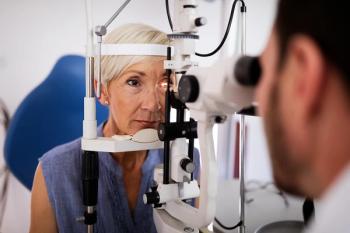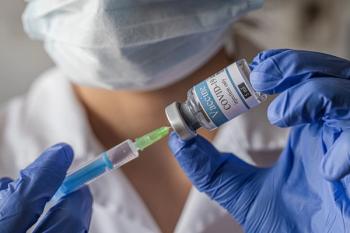
Current views on genetic testing for AMD
Genetic testing in AMD is a relatively new focus for optometrists and an important one to ensure that we are getting a complete view of our patients’ risk for developing advanced AMD. Although we are making some progress, we still have work to do to gain a better understanding of how to incorporate its use into clinical practice.
Earlier this year, I presented a lecture on
Genetic testing
Genetic testing for AMD is important on several fronts. Up to 71 percent of an individual’s risk of developing advanced AMD is tied to his genetics.1 This influence has a significantly greater impact in AMD than nearly any other disease, including obesity, cardiovascular disease, and even breast cancer, which we will discuss in greater detail. Genetic testing can help determine which patients are most at risk for developing advanced AMD and allow us to manage them accordingly. For example, if a patient faces a high level of genetic risk for AMD progression, we may want to examine that patient more frequently than we would if the patient showed similar signs and symptoms, but possessed a more favorable genetic profile. By adjusting our monitoring schedule based on risk, we can catch conversions to choroidal neovascularization (CNV) or wet AMD as quickly as possible and refer the patient for treatment sooner. As we know, earlier intervention with anti-VEGFs typically yields better long-term results.2
Additionally, there is some evidence that indicates genetic testing may predict patients’ response to certain treatments. In a study conducted by Peter J. Francis, MD, patients who had the CFH gene showed less improvement in their visual acuity while receiving ranibizumab therapy. Patients who had the C3 gene had reduced thickening and improved retinal architecture, and those who had vascular endothelial growth factor (VEGFA), FLT1, and CFH genes were reported to require fewer ranibizumab injections during the 12-month study.3 A second study by Hermann et al looking at the VEGFR2/KDR genes also seem to show difference in responses to ranibizumab based on genetic variation.4 The CATT Study, however, did not seem to demonstrate such a difference in response rates based on genetic variance.5
Conceptually, genetic testing may seem foreign to eyecare professionals, but this approach is employed quite frequently in other fields of medicine. For example, there are studies related to breast cancer indicating that certain genes, such as the BRCA 1 and 2 genes, may predict a person’s risk of developing breast cancer as well as what treatment may be most beneficial in certain cases.6 I have little doubt that within eye care, genetic testing will become more important as data establishes the benefit of predictive action regarding AMD.
Controversy
It is worth noting that within the topic of genetic testing for AMD, there exists some degree of controversy regarding the role of genetic testing and nutrition. Carl Awh, MD, and his colleagues reported that certain nutritional supplementations
However, Emily Y. Chew, MD, and her colleagues recently conducted a study that did not find a relationship between CFH and ARMS2 genotypes and vitamin response. They reported that the supplements reduced the rate of AMD progression across all genotype groups, and the genotypes at the CFH and ARMS2 loci did not statistically significantly alter the benefits of supplements. The study suggests genetic profile provides no benefits in managing nutritional supplements for patients with AMD.8 Findings from both studies are undoubtedly interesting. Ultimately, additional research is required before we can truly know, one way or the other, how vitamin therapy is affected by genetic profile.
Protocol
Genetic testing for AMD can positively impact an optometrist’s practice protocol. If we find patients are at high risk for AMD, we will want to see those patients more frequently. We can utilize technologies, such as ocular coherence tomography or
Currently, several genetic tests for AMD exist in the marketplace. RetnaGene (Nicox) has two such tests: one evaluates the risk of early or intermediate AMD progression to advanced choroidal neovascular disease within two, five, and 10 years, while a second assesses a patient’s lifetime risk for developing advanced AMD. Macula Risk PGx (ArcticDx) determines a patient’s risk of progression to advanced AMD over the same period. A third company, AutoGenomics, is currently working on a test as well that may be available soon.
Ultimately, I believe that genetic testing is here to stay. Although more time, research, and acceptance is needed, I believe it will help us take better care of our patients with AMD and lead to less vision loss. In the broader eyecare space, genetic testing for AMD will, hopefully, lead us down the path to true personalized medicine for our patients.
References
1. Seddon JM, Cote J, Page WF, et al. The US twin study of age-related macular degeneration: relative roles of genetic and environmental influences. Arch Ophthalmol. 2005 Mar;123(3):321-7.
2. Lim JH, Wickremasinghe SS, Xie J, et al. Delay to treatment and visual outcomes in patients treated with anti-vascular endopthelial growth factor for age-related macular degeneration. Am J Ophthalmol. 2012 Apr;153(4):678-86.
3. Francis PJ. The Influence of Genetics on Response to Treatment with Ranibizumab (Lucentis) for Age-Related Macular Degeneration: The Lucentis Genotype Study (An American Ophthalmological Society Thesis). Trans Am Ophthalmol Soc. 2011 Dec;109(3):115–56.
4. Hermann MM, Asten F, Muther PS, et al. Polymorphisms in Vascular Endothelial Growth Factor Receptor 2 Are Associated with Better Response Rates to Ranibizumab Treatment in Age-related Macular Degeneration. Ophthalmology. 2014 Apr;121(4):905-10.
5. Hagstrom, SA, Yuing, G, Pauer, G, et al. Pharmacogenetics for Genes Associated with Age-related Macular Degeneration in the Comparison of AMD Treatments Trials (CATT). Ophthalmology. 2012 Mar;120(3):593-9.
6. Alsop K, Fereday S, Meldrum C, et al. BRCA mutation frequency and patterns of treatment response in BRCA mutation-positive women with ovarian cancer: a report from the Australian Ovarian Cancer Study Group. J Clin Oncol. 2012 Jul 20;30(21):2654-63.
7. Awh CC, Lane AM, Hawken S, et al. CFH and ARMS2 genetic polymorphisms predict response to antioxidants and zinc in patients with age-related macular degeneration. Ophthalmology. 2013 Nov;120(11):2317-23.
8. Chew EY, Klein ML, Clemons TE, et al. No Clinically Significant Association between CFH and ARMS2 Genotypes and Response to Nutritional Supplements: AREDS Report Number 38. Ophthalmology. 2014 Jun 26.
Newsletter
Want more insights like this? Subscribe to Optometry Times and get clinical pearls and practice tips delivered straight to your inbox.




























